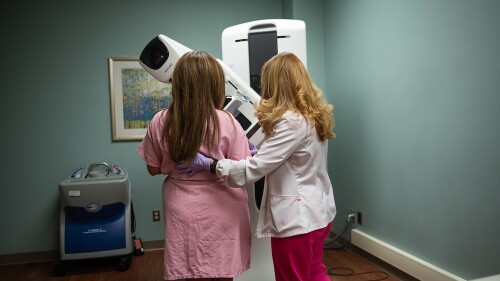25. That’s the age that doctors recommend getting your first cancer screening.
Seem early? (We were surprised, too.)
But it’s true. And Novant Health cancer specialists are here to break down all of the age-recommended screenings you should be scheduling from your 20s to your 60s.
(Note: If you have a family history of cancer, genetic disorders, or other risk factors, you may need to begin screening earlier or consider genetic testing and counseling.)
20s + 30s
- Cervical cancer screening: Women 25-30 should get a Pap test every three years, while women over 30 should do so every three to five years.
40s
- Colon cancer screening: People at average risk should start testing at age 45 through age 75. There are multiple ways to screen, so screening frequency depends on the type of test. Between 30-50? Here’s what young adults should know about the alarming rise of early-onset colorectal cancers.
- Breast cancer screening: Women aged 40+ should have an annual mammogram screening. Pro tip: Walk-in mammogram appointments are available at Novant Health’s new breast center + in Ballantyne.
- Prostate cancer screening: Starting at age 45, men at higher risk of prostate cancer (think: African American men or having close-family history) should talk to their doctor about being tested. See what a high PSA level could mean.
50s + 60s
- Lung cancer screening: People aged 50-80 who smoke or used to smoke + have a 20 pack-year history (20 years of smoking one pack per day) should get yearly lung cancer screenings with a low-dose CT (LDCT) scan.
Of course, Novant Health docs suggest making healthy choices to decrease your overall cancer risk, including maintaining a healthy weight, eating well, staying active, limiting alcohol, and avoiding tobacco altogether.
If your screening returns unexpected results...
Know that Novant Health’s nationally recognized Cancer Institute treats 100 tumor types at their treatment centers and clinics throughout NC, and can help guide you through your cancer journey. Recently-diagnosed patients can also request a second opinion.
Explore Novant Health’s cancer care






















